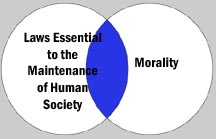I see that Lance Mannion has taken up the question of when “life” begins. I see that Shakespeare’s Sister mostly agrees with Lance; Jedmunds of Pandagon mostly doesn’t.
Now I want to confuse everyone by arguing that “when life begins” is the wrong question. It’s the wrong question because life doesn’t begin. Or, at least, it hasn’t begun on this planet in a very long time. However life got to Earth — between 3 and 4 billion years ago, I believe — once it established it hasn’t been observed to “begin” again. It just continues, expressing itself in countless forms. The forms come and go — in a sense — but not life itself.
It will be argued that fertilization marks the beginning of a unique individual and is, therefore, a significant moment in the life process — the point when a life begins. But let’s say a couple of weeks later the egg divides into twins or triplets. Did those individuals’ lives begin with the conception? Or, since they didn’t exist as individuals at conception, is the cell division something like an existential reboot?
Further, in the grand scheme of things, is any one moment really separable from all the other moments, the couplings, the countless episodes of cell mitosis going back to the first stromatolites and microbes and macromolecules to the beginning, which is beginningless as far as I know, considering that a stray enzyme at any point over billions of years would have resulted in you being a lungfish?
I don’t have an answer to that. I’m just sayin’ “beginnings” are way overrated.
The real question, seems to me, is when does an individual begin? Is there a clear, bright moment at which we can all agree, “yep, that’s Fred,” and be done with it?
Some argue that the product of pregnancy is a unique individual from conception because its DNA is different from its mother’s. But if unique DNA combinations are what make a unique individual, you’d have to conclude that the twins from the third paragraph are the same person, divided. And if we give you a transplanted heart, lung, and kidney, each with unique DNA combinations from their respective donors, does that make you four different people?
I don’t think science can help us with this one, people. Indeed, if you step back and look at human civilization throughout space and time, you might notice that “person” is a social construct that has been constructed in very different ways by different societies. At various times only men, or only people of a certain skin color, or only people from our tribe, or only people of a particular caste or class, were considered “persons.” We may think we have reached maximum enlightenment by considering all human beings “persons” (assuming we all do, which I question), but it’s possible our distant descendants will expand “person” to include, say, other primates, whales, dolphins, and border collies. You never know.
The argument made by many opponents to legal abortion is that the product of pregnancy is human life, and human life is sacred; therefore, it must be protected. There’s no question that a living human embryo is both alive and human, but when you call it “sacred” you’re throwing a religious concept into the mix. And the great religions of the world do not at all agree on the question of when (or even whether) “human life” becomes “sacred.” Some say at conception, some say at “quickening,” some say at viability, some say at birth. And some will tell you that everything and nothing are equally sacred, so stop asking stupid questions.
The reason we’re even having this discussion is to settle the question of abortion as a matter of law. But as a legal matter, the question of when humans are allowed to take the lives of other humans rarely has absolutist answers. Some kind of regulation about who can kill whom is necessary for civilization, since we can’t very comfortably live together in communities without some assurance our neighbors won’t throttle us in our sleep. But there are always loopholes. Through history, in many societies (even Christian ones), a noble could kill a peasant or slave without penalty. Today governments can order wars or impose a death penalty, and legally that’s not murder.
I tend to get impatient with people who argue that laws are based on morality, and abortion is immoral, therefore it ought to be illegal. As I said in the last paragraph, there are some laws essential to human civilization. These laws regulate who can kill whom and who can own what. They make commerce possible by imposing penalties for fraud. They make complex human enterprises possible by enforcing contracts. Exactly how law has regulated these matters has changed considerably over time; the important point is that, within a given society, there are basic rules everyone is supposed to agree to so that society can function.
 The realm of morality, however, is separate from the realm of legality. There are all manner of things that we might consider immoral that are not, in fact, illegal; adultery is a good example. Such acts may have harmful personal consequences, but regulating them isn’t necessary to civilization. And I don’t see what’s immoral about, say, misjudging how many coins you should put in the parking meter. That’s why I tend to see the legal versus moral question on a Venn diagram. The diagram here isn’t entirely accurate since the blue area should be bigger — law and morality intersect more often than they don’t. I’m just saying that answering the moral question of abortion (assuming we ever will) does not tell us whether an act should be legal or not. In fact, since abortion is legal (with varying restrictions) in most democratic nations today with no discernible damage to civilization itself, I’d say the abortion question falls outside the blue area of the diagram.
The realm of morality, however, is separate from the realm of legality. There are all manner of things that we might consider immoral that are not, in fact, illegal; adultery is a good example. Such acts may have harmful personal consequences, but regulating them isn’t necessary to civilization. And I don’t see what’s immoral about, say, misjudging how many coins you should put in the parking meter. That’s why I tend to see the legal versus moral question on a Venn diagram. The diagram here isn’t entirely accurate since the blue area should be bigger — law and morality intersect more often than they don’t. I’m just saying that answering the moral question of abortion (assuming we ever will) does not tell us whether an act should be legal or not. In fact, since abortion is legal (with varying restrictions) in most democratic nations today with no discernible damage to civilization itself, I’d say the abortion question falls outside the blue area of the diagram.
On the question of morality I disagree a lot with Ezra Klein when he says “confused polling on abortion is evidence that Americans have confused views on abortion.” I think people are not so much confused as limited. Our conceptions of life or humanity or individuality or the self are to a large extent conditioned into us by our culture. It’s very hard to step outside of our conditioning and take a broader view. We’re all blind men feeling an elephant — our ideas about what an elephant is depend on what particular part we happen to be feeling (an elephant is like a a tree trunk? a wall? a fan?). Following this metaphor, there are all manner of people in America today who do not feel confused at all about that elephant. They’ve got hold of its trunk, and they are certain it’s just like a snake. End of argument.
If anything, most people aren’t confused enough.
Our notions of where a fetus fits on the morality scale depend very much on the angle from which we view the question. A fetus is human. But humans are sentient, and a fetus is (so science tells us) insentient. A fetus is like a parasite, or a lower life form. A fetus is God. A fetus is a baby. A fetus is not a baby. A fetus is a potential baby. A fetus is sacred. Nothing is sacred. Everything is sacred.
How about, All of the above?
In case you’re wondering, from a Buddhist perspective it might be argued that since a “person” is an aggregate of the five skandhas (form, sensation, perception, discrimination, consciousness) and an embryo or fetus has only form, it’s not a person. On the other hand, Buddhism teaches that each of us is all of us, throughout space and time. The cells of whatever is conceived contain all life forms, from the beginningless beginning to the endless end, perfect and complete. Interfering with life’s attempts to express itself is a serious matter.
So where does that leave us? It leaves us with individuals who have to make hard choices. Struggling with hard choices is a distinctively human activity. I think it’s something we need to do to be fully human. It helps us wake up. The decisions we make may be less important than the fact that we can make decisions.
I have written in the past (such as here) why I think abortion should be legal, at least until the fetus is viable. My opinion is based mostly on the effects of abortion law in the lives of women. You might notice I don’t spin my wheels much over the question of morality, since I’ve come to see that morality depends on the state of mind in which one acts as much as the act itself. People do “good” things for selfish reasons, and “bad” things for altruistic reasons. Judge not, lest ye be judged.
So, I say, ambiguity is good for you; don’t be afraid of it. Go forth and be human and work it out for yourselves.
[Note: The title of the post refers to the first koan of The Mumonkon. If it doesn’t make any sense to you, that’s OK.]

 It is true that the overwhelming majority of Americans have been Christian, but not being Christian never excluded anyone from being American. There have been Jews in North America for 350 years, for example, and Jews supported independence and fought in the Revolution. There have been Buddhists in America since the 1840s; today
It is true that the overwhelming majority of Americans have been Christian, but not being Christian never excluded anyone from being American. There have been Jews in North America for 350 years, for example, and Jews supported independence and fought in the Revolution. There have been Buddhists in America since the 1840s; today  Laurie Goodstein writes in the New York Times that many Christian evangelicals are criticizing the
Laurie Goodstein writes in the New York Times that many Christian evangelicals are criticizing the 